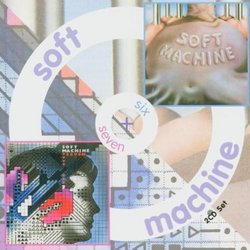| All Artists: Soft Machine Title: Six/Seven Members Wishing: 2 Total Copies: 0 Label: Edsel Records UK Release Date: 5/11/2004 Album Type: Import, Original recording remastered Genres: Jazz, Special Interest, Pop, Rock, Classic Rock Styles: Experimental Music, Progressive, Progressive Rock, Psychedelic Rock Number of Discs: 2 SwapaCD Credits: 2 UPCs: 740155174026, 766487327640 |
Search - Soft Machine :: Six/Seven
 | Soft Machine Six/Seven Genres: Jazz, Special Interest, Pop, Rock, Classic Rock
|
Larger Image |
CD Details |
CD ReviewsLate Soft Machine hj | London | 01/29/2005 (3 out of 5 stars) "1970-71 were turbulent years for Soft Machine with many comings and goings, notably the departure of Robert Wyatt and Elton Dean. For most people that was the end of the story and it is often forgotten that there was a distinctive late edition of the band in 72-74, featuring regulars Ratledge and Hopper joined by drummer John Marshall and multi-instrumentalist Karl Jenkins, which recorded two final albums for CBS. "Six" was a double album - in the vogue of the time one disc live / one disc studio, all included on a single CD here. Arguably this was the most musically accomplished version of the band. The live album is one long suite, effortlessly gliding back and forth through tunes and themes (mostly drawn from "FIFTH"). It's very tight and fluid, driven by understated, shifting funk or rock rhythmic patterns. The studio album contains just four tracks. "Sot Weed Factor" and "Chloe" are developments out of the languorous style pioneered on parts of "THIRD": Terry Riley-ish loops, loping repetitive funk drum and bass, tinkling keyboards. Jenkins generally eschews jazzy improv, preferring to overlay the tracks with elegant, repetitive, extended lines on oboe or soprano. It's an over-used word but I'd have to describe this music as "cool". It's a far cry from the hyperactive fusion music of the 70s and might even prefigure some of the ambient, trance and trip-hop of the 90s. The cool-muzak sensibility even reminds me sometimes of Air (well, Soft Machine always were big in France!). The other two studio tracks are busier, sounding like sketches for compositions and don't stand up so well. The suspicion that the composing was in decline is confirmed on "SEVEN". Apparently recorded in a hurry and with Hopper replaced by Roy Babbington on bass, the first half relies too much on manic riff-based fusion cliché. There's also one track plagiarized wholesale from MacLaughlin's "EXTRAPOLATION". The second half reverts to the cool trancey mode which, personally, I quite like. Bizarrely Karl Jenkins is now Britain's most popular living classical composer (of the "new age" variety I believe). This 2CD reissue is tackily packaged and has a liner note which goes on about Canterbury and swinging London and has little to do with the actual music on these albums or its context. No bonus cuts. But it is cheap and, given that "SIX" was a double album, not bad value. It usefully rounds up the late era Soft Machine and as such is recommended to fans. " Fine blend of minimalism and jazz rock Jeffrey J.Park | Massachusetts, USA | 03/23/2009 (5 out of 5 stars) "This 2 CD set packages Six (1973) and Seven (1973) together and should be of interest to those folks on a tight budget. The two albums are both fine examples of the particular style of jazz rock practiced by Soft Machine, which blends aspects of American minimalism, jazz rock, and Canterbury rock together. I enjoyed both albums a great deal.
Six The lineup includes Mike Ratledge (organ, synthesizers (mostly moog I think); John Marshall (drums and percussion); Hugh Hopper (electric and acoustic bass); and Karl Jenkins (oboe, baritone and soprano saxophones; recorder; and electric and grand piano). The level of musicianship is very high throughout. This album consists of live material (tracks 1-11) and studio tracks recorded in late 1972 (12-15). The live tracks are pretty good and feature decent sound quality. Stylistically, the live material is closer to jazz. The studio tracks are pretty spacey and feature more in the way of the band's minimalist tendencies along with jazz rock. Repeated (and hypnotic) patterns are played on the keyboards. Seven The lineup is the same as that on Six, with the exception of the replacement of Hugh Hopper with Roy Babbington (electric and acoustic bass). The music on this album runs the gamut from very spacey and dreamy passages to vigorous jazz rock instrumentals that feature a heavy ostinato played in unison on the bass and the synthesizers. Typically, Karl solos over these sections. Some of my favorite tracks however, include the spacier and more experimental pieces such as the percussion heavy and psychedelic D.I.S (written by John Marshall) and Karl Jenkin's Carol Ann, which features some haunting sax playing and eerie synthesizer parts. Mike Ratledge's minimalist tendencies are still felt here and there and he develops some very nice hypnotic ostinatos on the organ (Penny Hitch is a great example of this). Many of the spacier sections are used to link several tracks together into mini-suites of sorts. It works very well. This 2 CD set is not so hot in terms of the packaging, but the sound quality is pretty decent. Liner notes feature the lineups and track listing along with some historical notes, including brief comments on Six and Seven. All in all, I found the blend of minimalism and jazz rock to be very interesting, although fans of the earlier material might not enjoy the music as much. This Edsel Records package is appealing because I am on a tight budget and found this to be an inexpensive way to get two Soft Machine albums. Recommended." |

 Track Listings (15) - Disc #1
Track Listings (15) - Disc #1